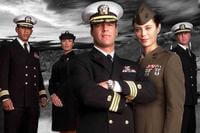
Obviously, in a culture tasked with making life-and-death decisions about the fate of the free world, making decisions about Pentagon support of Hollywood movies doesn't qualify as the most critical task on the national agenda. However, that doesn't mean it's not incredibly difficult. How can someone look at a few typed pages and maybe some concept drawings and decide which movies will reflect well on the men and women who serve our country?
When things turn out well, you get Act of Valor. It may not win a truckload of Oscars next spring, but the filmmakers did a great job of putting at a part of the Navy SEAL culture onscreen for regular Americans (and foreigners) to see.
And then you have Battleship and The Avengers. The Navy went all-in on one and the Pentagon passed on the other. Why?

Rihanna accurately portrays the United States Navy.
Both movies portray fictional universes but each has a story in which the United States military plays a critical role. Battleship got full support, as explained in talking points included an email circulated by the Navy:
Produced by Universal Pictures and directed by Peter Berg, BATTLESHIP was made with the support of the Department of Defense and the Navy. As you know, we ask ourselves some key questions before supporting a major motion picture. First, does the script accurately portray the Navy? Second, does it positively represent our service and our Sailors? Third, can we support a film without impacting our operations? And finally, do we believe that it could have a positive impact on recruiting? In the case of BATTLESHIP, we felt the answer was "Yes" to each of those questions.In addition, there are risks not to participating as well. Whether or not we supported Battleship, the film was going to be made -- it was going to carry our brand and represent who we are to the American people. We can't take everyone out to our ships, but we can work with Hollywood and bring the Navy to life on the big screen. Consequently, it's in our best interest to engage and make sure that movies like Battleship accurately portray who we are and what we do as a Navy.
Following DoD approval in 2010, the film's production began in early 2010, and principal photography took place during the Pacific Fleet's RIMPAC training exercise later that year. Because filming took place on top of already scheduled training events, it did not impair the exercise and there was no cost to the Navy or American taxpayers. Additional filming also took place in Hawaii, San Diego, and on a film set in Baton Rouge, La., constructed by Universal Studios. The end result is a film that provides movie-goers with a realistic look of the Navy and our Sailors operating at sea - scenes that I think reflect well on the Navy.
In contrast, the Pentagon initially gave Marvel its support for The Avengers but pulled out after deciding that S.H.I.E.L.D. doesn't accurately represent the reality of military command. Here's what the Defense Department's Hollywood liasion Phil Strub told WIRED's Danger Room:
We couldn’t reconcile the unreality of this international organization and our place in it. To whom did S.H.I.E.L.D. answer? Did we work for S.H.I.E.L.D.? We hit that roadblock and decided we couldn’t do anything.
These statements raise a couple of critical questions. Accept for a moment that the planet Earth is never going to be threatened by alien invasion. If that's true, then how can a movie that looks like the seafaring sequel to Transformers ever "accurately portray the Navy"? And let's also grant the premise that the entire Marvel comic universe is based on 1950s conspiracy theories about shadow organizations who may or may not answer to democratically elected governments.
Really, if battles against robot aliens from the deep aren't a misrepresentation of our military mission, how can we be worried about a quasi-governmental (fictional) organization that has a long, successful history of fighting alongside the U.S. military (at least in comic books)? And why is Captain Steve Rogers allowed to participate in an Initiative that doesn't have the support and cooperation of his commanding officers?
The Avengers is a great superhero movie and enjoyed the biggest grossing opening weekend of all time. Battleship hasn't yet opened in the United States, but just about everyone here at UTR has expressed doubts about the movie. While a Pentagon decision to stay away from both movies would be understandable, it's hard to imagine anyone saying yes to one and not both.

Thor and Captain America could sure use some help here.
All of this leaves one nagging question: with proper air and ground support from the United States Military, could the Avengers have defeated Loki's minions with less damage to the New York City skyline? We'll never know.




